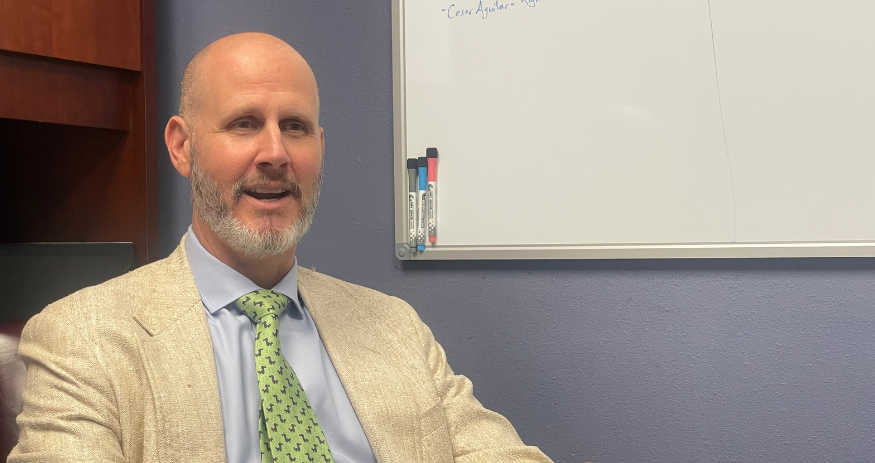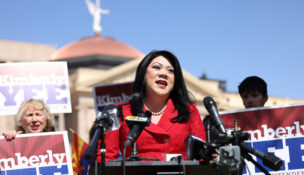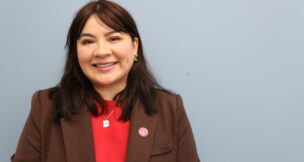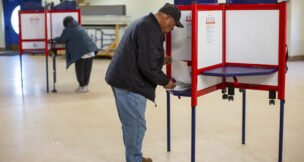Rep. Charles Lucking: From Peace Corps to housing rights attorney to lawmaker
Jakob Thorington Arizona Capitol Times//October 4, 2024//
Rep. Charles Lucking: From Peace Corps to housing rights attorney to lawmaker
Jakob Thorington Arizona Capitol Times//October 4, 2024//
The Democratic caucus in the Arizona House of Representatives has seen seven new members this year following a slew of resignations from elected caucus members. Rep. Charles Lucking, D-Phoenix, was appointed to the House in February and spoke about his experience as an appointee to the Legislature in a recent interview with the Arizona Capitol Times.
The questions and answers have been edited lightly for style and clarity.
How would you describe your experience at the Legislature?
One of the most interesting things I’ve ever done in my entire life and I’ve done a lot of really interesting things. I served in the Peace Corps. I’ve had jobs where I just went in cold and the drinking from a fire hose thing is not new to me. But this has been one of the most challenging but also just one of the most exhilarating and fun things I’ve ever done in my life. Incredibly difficult, but also very fulfilling.
What made you decide you wanted to seek an appointment?
I am a housing rights attorney, and I was working with Community Legal Services, which is our free, nonprofit law firm here in town. Our eviction laws are ancient and broken. I was thinking well, maybe I’ll run for the Legislature and work on changing our eviction laws in 2026 or 2028. In LD5, both of our representatives resigned their seats. When the second one became available, I’m like, well, I could wait, or I could throw my hat in the ring now and do some work on housing and eviction right now because it’s an emergency. So I gave it a go. There was a point where my legislative district had no representation (in the House).
What was the learning curve like as an appointed representative?
It was crossover week when I was appointed. I know there was one day we voted on like 140 bills. We were there late every single day. It spilled over into the following week, and I really had to figure out quickly how to adequately understand like 100 bills for the next day. One of the things that was different from my expectations was thinking I’ll have the opportunity to read every single bill that I vote on. But if you’re going to be voting on 100 bills or 140 bills in one day, there’s just no physical way anyone could do that. I really had to figure out very quickly what the resources were that I had and what the processes were that other representatives in similar situations were using. I really like being thrown into the deep end and having to learn how to swim really quick. It’s a situation that I’ve grown to love. After a couple weeks, I knew how to be functional and figured it out fairly quickly.
What else was a surprise for you?
The most pleasant surprise was the quantity and quality of resources that we have available to us as legislators, and I’m specifically talking about our policy advisers. We have a team of people who are just absolutely dynamite. If it’s 10 p.m. and you’re reading a bill and you don’t know what the language is really getting at, we have people who are experts on it. They will usually know the answers to any question you have and if not, they will do the digging and do the research to get you the information you need. I didn’t realize that sort of support system existed for legislators.
What was your favorite moment of the session?
When we repealed the 1864 abortion ban, I was really proud that I was able to play a part in that. I was also really pleased that some of the bills that will alleviate our housing emergency were able to get passed, but there was one thing that didn’t really make any news. It was pretty small but I think ultimately it will end up saving lives. There was a piece of legislation that came before the Military Affairs and Public Safety Committee, and it was essentially a bill that would allow first responders from our neighboring states to cross the border to address emergencies in Arizona. In committee, I voted against it because the language was not dialed in, and I thought that it could potentially be really problematic but I liked the idea. I voiced my thoughts and my concerns with it and then I had several phone calls with the sponsor and the people who were working on it to get the definitions and intent dialed in.
Is this something you would want to do again?
Absolutely. I just found this work so important because what we do here touches the lives of everybody. I feel like I have the capability of being a really good legislator. I found the work just incredibly interesting and gratifying and I feel like my colleagues value me as well, so I’m going to run again in 2026.
What about the Legislature needs to change?
Everybody knows there’s a lack of communication between the two sides of the aisle that is causing dysfunction in our legislative process. I’m 47. I grew up in Arizona, and it really wasn’t that long ago where Republicans and Democrats would work together to solve big issues. That’s not really happening right now. I think that’s something that’s happening culturally both inside and outside of our political system, but I am making a personal effort to make sure that I’m being communicative and open to all the conversations with people from the other side of the aisle. The only way we’re going to get past this kind of loggerhead is if, individually, all of our legislators and governmental leaders are making that effort on their own behalf, and that our leadership is being a model of overcoming this sort of block that’s happening between the two sides of the political spectrum.
What was it like for you stepping into the shoes of former Reps. Amish Shah and Jennifer Longdon – two Democrats who had relatively successful tenures here?
Both of them were absolutely incredible leaders, not just for our legislative district, but for the state and continue to be in both of their current roles. They have been both great mentors for me and I have an immense amount of respect for them. I never felt like there was an expectation that I would be Dr. Shah or like anything like Dr. Shah. One of the things that’s great about the Legislature is that every single person in there is a very unique individual who comes from a different background. I was delighted by how welcoming everybody in the caucus was and how helpful Dr. Shah and Jen Longdon were. I think what people care about, whether you’re new or not, is that you’re listening to your constituents. I 100% feel that to be a good leader and a good representative, the most important thing is talking to all the different communities that are out there and, certainly Dr. Shah and Rep. Longdon really exemplified that as well.
There was a lot of fuss over how the budget was negotiated this year. What were your takeaways and what did you learn from that experience?
That was really difficult because we’re in just an absolutely massive deficit and as a Democrat, there are a lot of social safety net programs that got caught in a big way. It’s painful for me to see that, but it’s going to be way more painful for the populations of Arizona that are going to feel the direct impact of those budget cuts. Housing is going to see a huge impact on that. Last year was a gigantic surplus and having the contrast between the way the surplus was handled and the deficit was handled was really eye-opening for all of us in the Legislature. My job as a legislator is to make intelligent and informed decisions about the vote to adequately represent the people in my district and the people of Arizona. The cuts being so drastic made it really hard but ultimately, I think we got to the best budget. I voted yes on it, but it was probably the most difficult vote I cast in the whole session.
What housing bills need to run over the next few years?
I have eight eviction bills that I’m writing right now with a few other of my Democrat legislators. I won’t be here to carry them next year, but I have a colleague who will. With eviction, we can make huge changes that are very small and bipartisan bills that are going to have a massive effect on housing insecurity. Those need to be priority number one. Arizona had a little less than 100,000 evictions filed last year, which is about a 20-year high. We don’t have rental assistance funded by the state. Most states have rental assistance in their state budget. Almost every state with the exception of three states has legal services funded by the state budget. We don’t have that in Arizona. Our eviction systems are some of the worst in the nation. It’s an absolute crisis right now. Our Landlord Tenant Act is approaching 50 years old. We are way behind and we need to catch up fast because this is something that is only going to get worse. The biggest immediate change we could make is extending the timeframe because you can go from being late on your rent to out on the street in a very short time in Arizona.












































